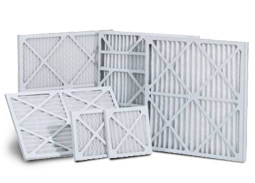After what seemed like a long hot summer I was excited for the temperatures to turn a bit cooler. Unfortunately, this also means that pollen is thick in the air (at least in Arkansas). We control these allergens inside our homes and businesses by using a filter in the HVAC system. If you’ve ever shopped for filters, you know there are many to choose from. But which one to buy? In this case, higher efficiency filter isn’t always the best choice.
HVAC filters are rated using a standard called the Minimum Efficiency Reporting Value (MERV). The higher the MERV value, the finer the filtration. All filters constrict the airflow (by adding pressure drop), and generally the higher the MERV value the more the airflow is restricted. Also, as time passes and your filter collects particles out of the air it will restrict the air more and more. As you can imagine, a more restrictive filter causes your fan to run more or at a higher speed (if the drive is variable) and this can reduce the overall system efficiency.
The first step to finding the right balance between filter efficiency and system efficiency is to select the right filter. Unless you are operating a cleanroom, laboratory, hospital or a smoking lounge you shouldn’t need a filter with a MERV rating higher than 13. Filters rated above 4 can be expected to remove pollen from the air as well as dust and textile fibers. Filters rated above 7 can remove mold spores. You can see a full breakdown of the MERV ratings here.
You should also purchase a filter that has a rated pressure drop less than what your HVAC unit can handle. As the air flows through the return ductwork and filters, the air pressure drops from friction. This is measured using inches of water gauge (w.g.). For example, a fan blower may be rated to overcome 0.5 inches w.g. If the return ductwork has a pressure loss of 0.4 inches w.g. and you install a filter that has a pressure drop of 0.3 w.g. then your system will no longer work very well (0.7 > 0.5). Most systems are designed and installed with return ductwork pressure drops less than 0.05 w.g. so there usually isn’t much to worry about here. Even so, if you want to install a high efficiency filter it may be worth it to have a professional analyze the system to make sure you aren’t hurting your system efficiency too much by installing a more efficient filter.
As mentioned earlier, the filter pressure drop can also increase as particles build up on the filter. To combat this, the filter should be replaced or cleaned (if washable) periodically to keep airflow up. In general, disposable filters should be replaced every three months and washable filters should be cleaned once a month. Of course, depending on your building type and usage it may require additional filter replacements.
It is important to choose a filter with the minimum acceptable MERV rating that is also selected to work well with the HVAC unit. Otherwise, the unit efficiency may be impacted and building costs would go up. If you are having air quality issues with your building or are interested in increasing efficiency, Forward Engineers can perform an energy audit to identity projects that lead to cost savings. Please contact us and we’ll be happy to take a look.

